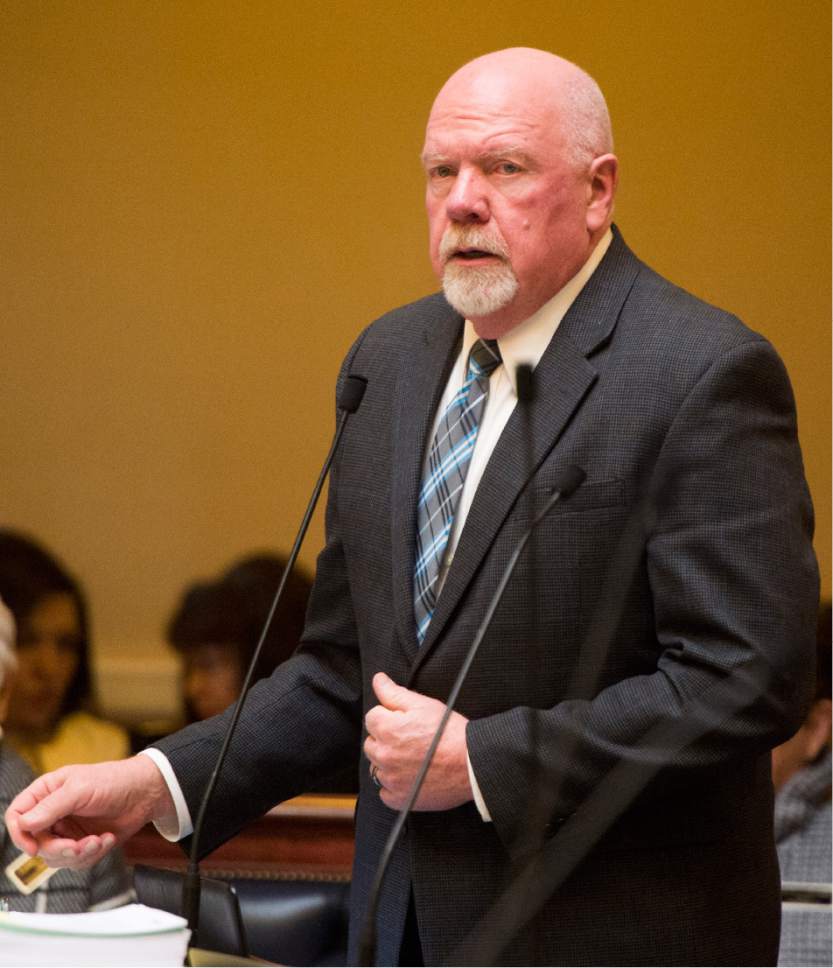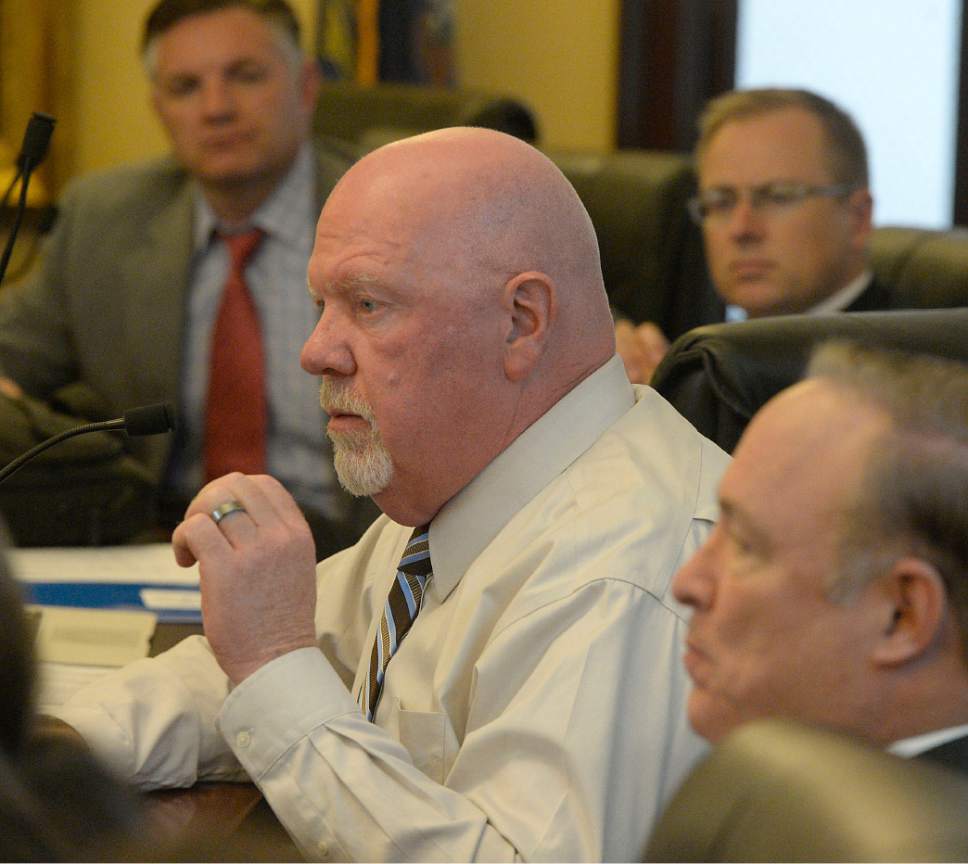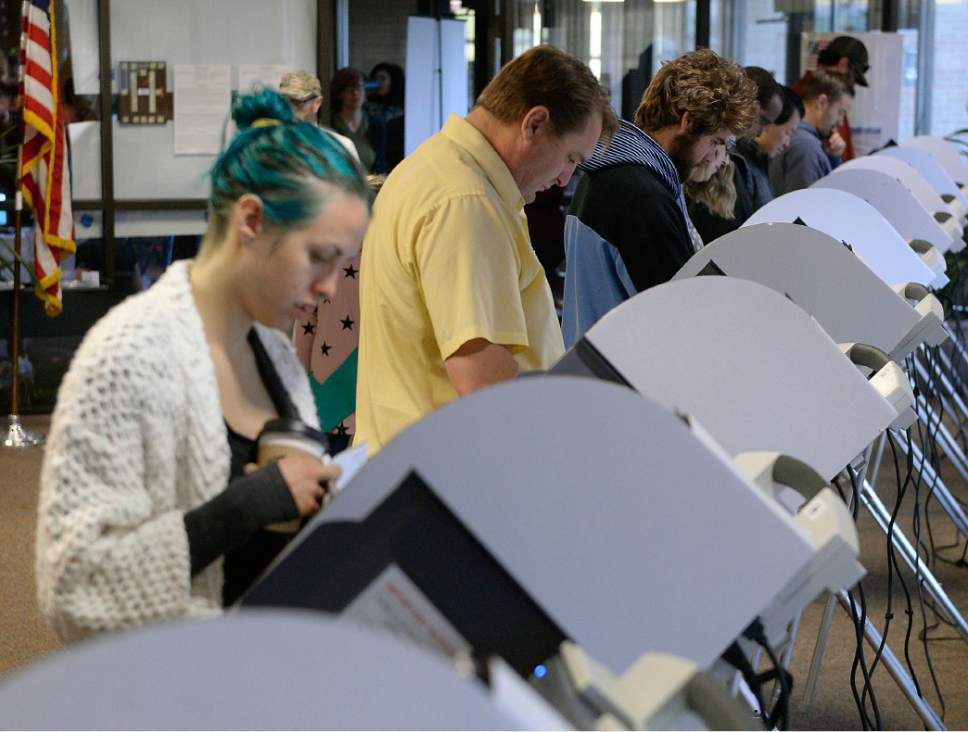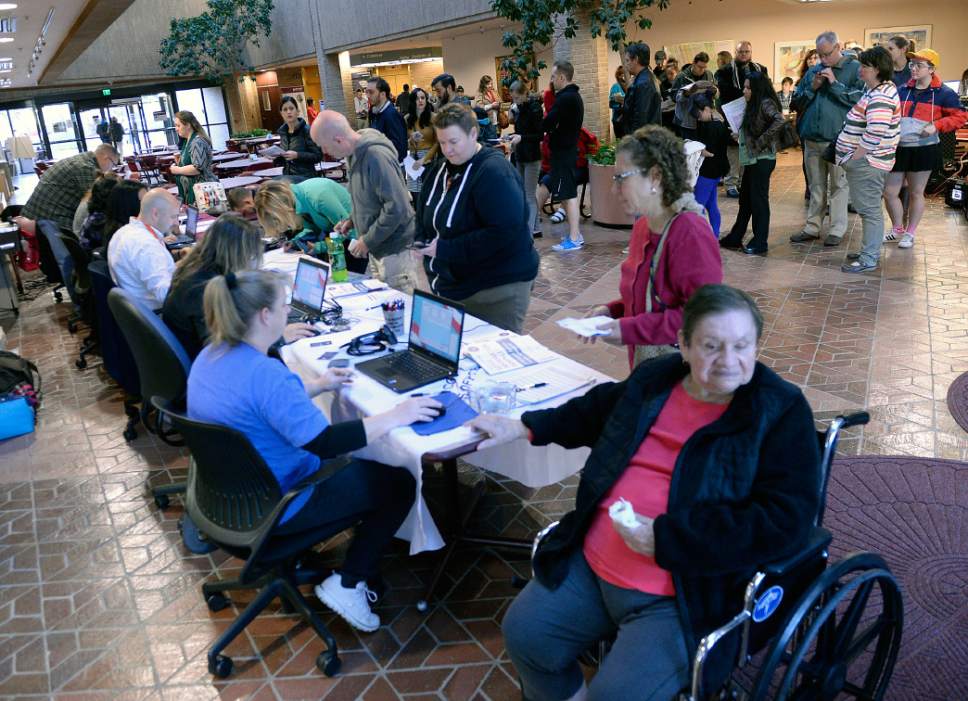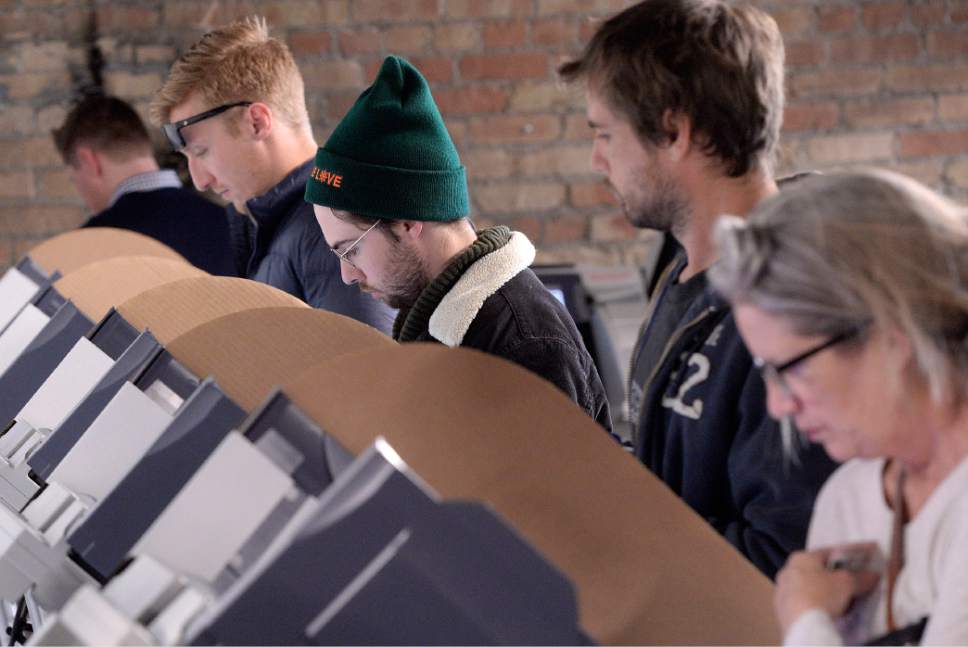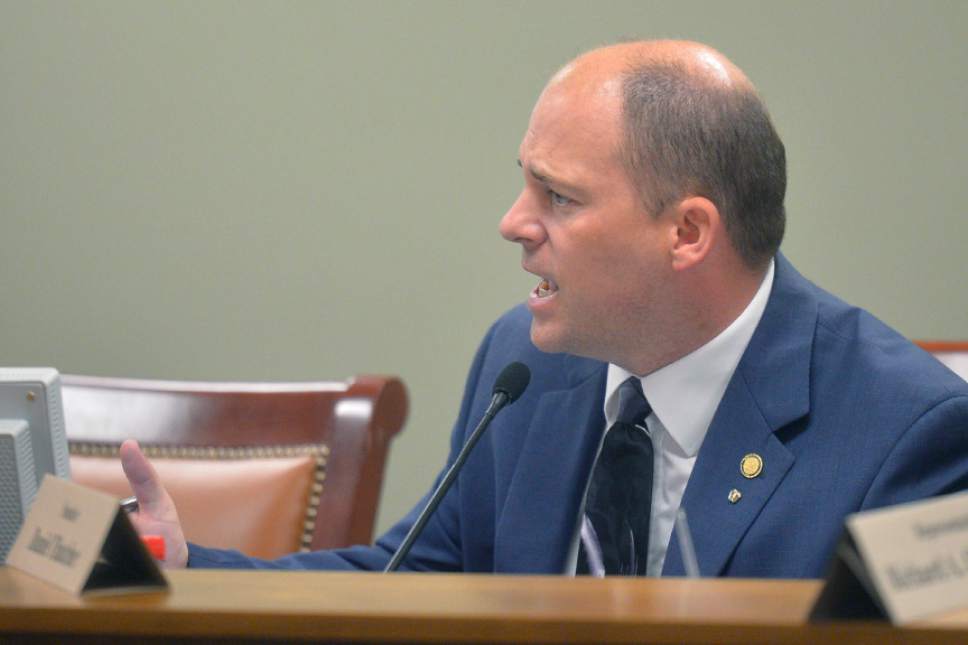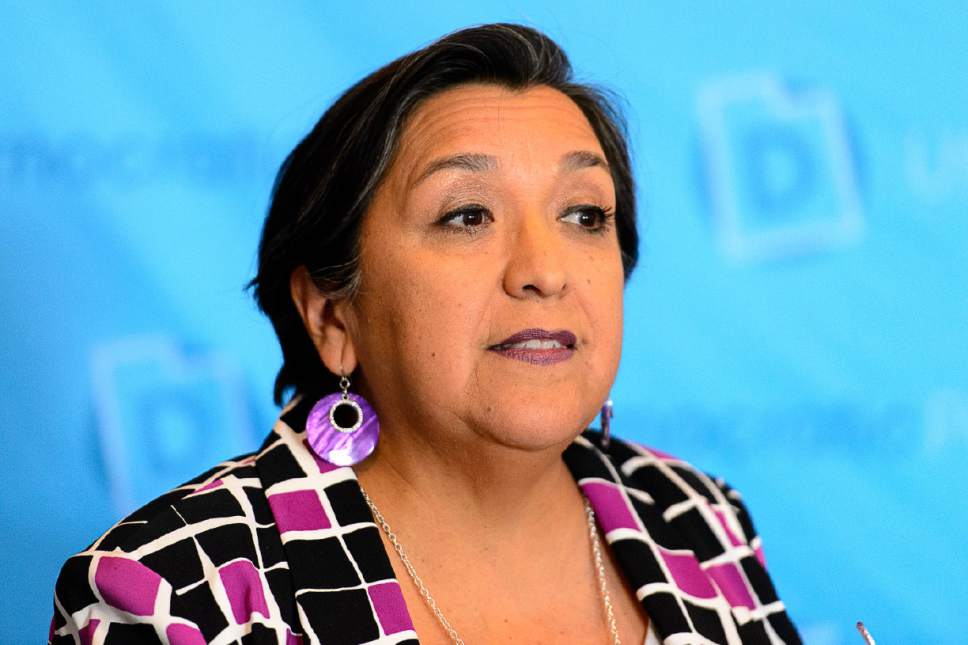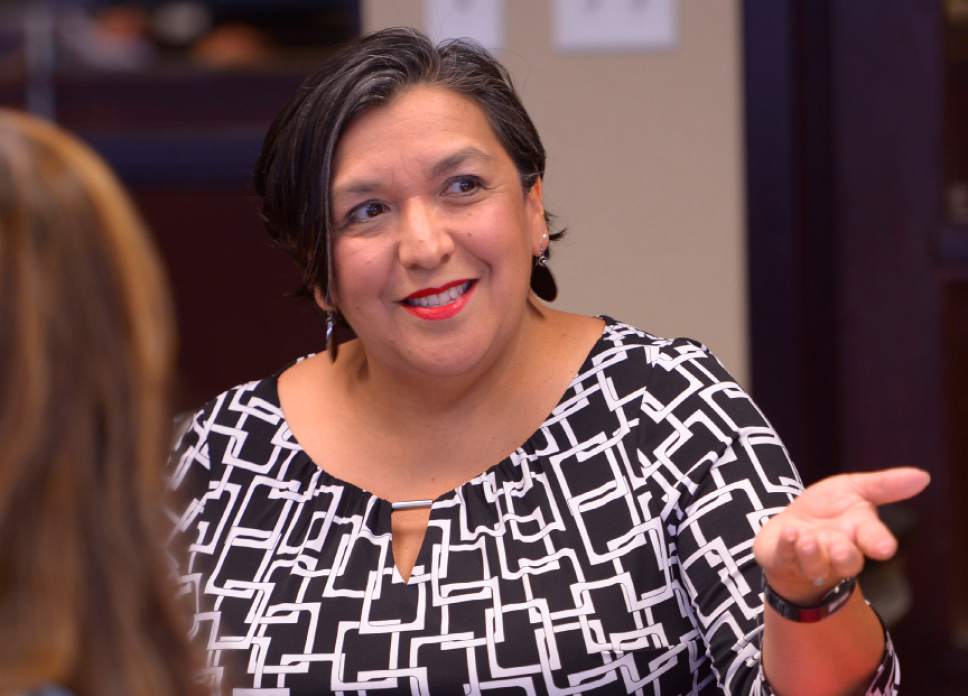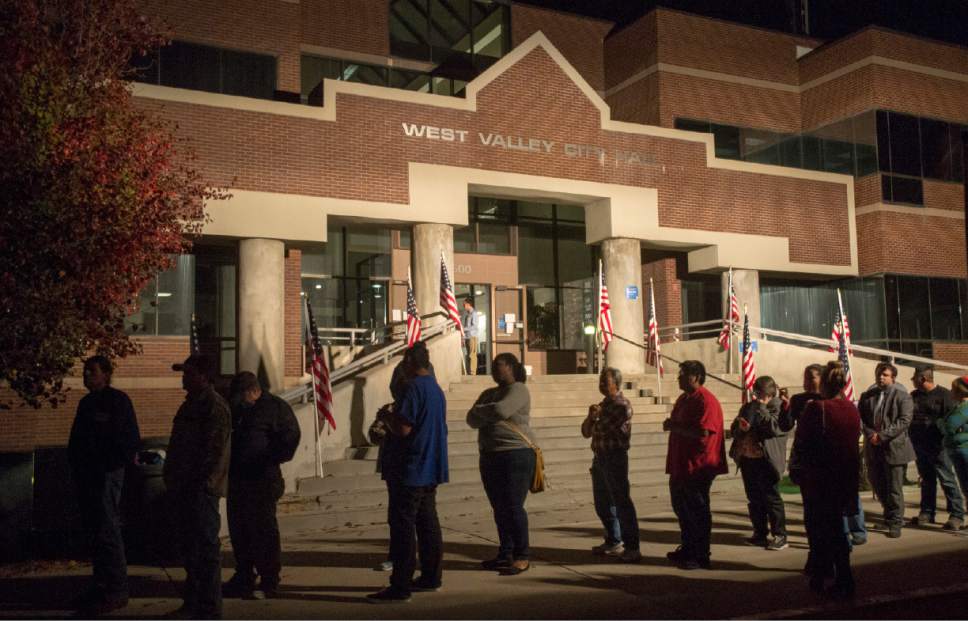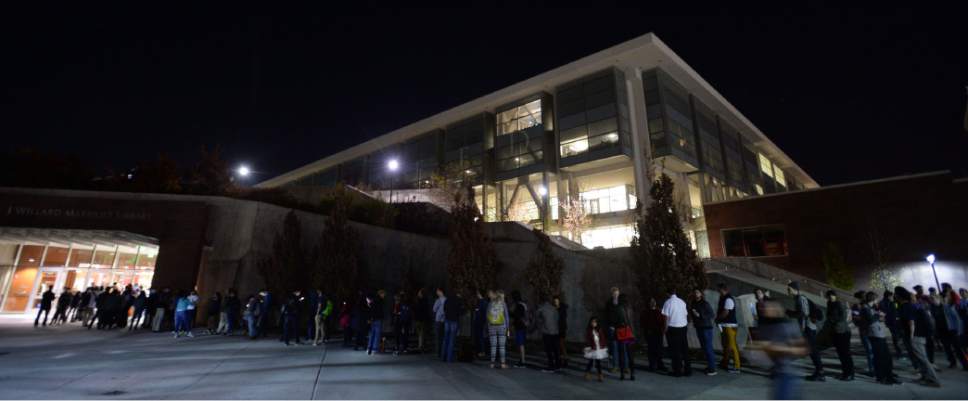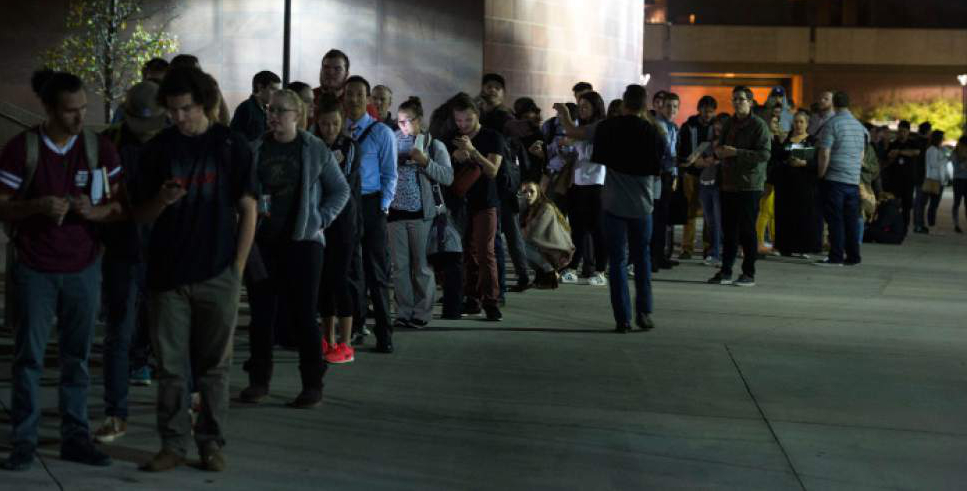This is an archived article that was published on sltrib.com in 2016, and information in the article may be outdated. It is provided only for personal research purposes and may not be reprinted.
After one of the most unusual elections in history, Utah legislators are busy drafting numerous bills seeking to make changes in election law.
Proposals include a variety of schemes to help shorten voting lines — which were up to four-hours long this year. Some lawmakers want to force winners to achieve a majority of the vote, not just a plurality. And some want to ensure that, unlike this year, the presidential candidate who wins the popular vote wins the election.
Here are some of the more than a dozen bill files that legislators have opened so far seeking to change election law when they convene in January:
—
Long lines • Sen. Daniel Thatcher, R-West Valley City, stood in line for more than two hours to vote at Hunter Library on Election Day. Others lined up there for up to four hours.
"What really drives me crazy is how many people I saw that simply turned around and went home when they saw those lines," Thatcher says.
He asserts the problems can be blamed on Salt Lake County's attempt to convert to a vote-by-mail system — and he plans to push for some changes.
The county attributes the long waits to the unexpectedly high number of people who failed to mail back ballots and showed up to cast votes in person.
"The county clerk thought that two voting centers [in West Valley City] would be enough to handle its 130,000 residents. It's not," Thatcher said. He plans to meet with the lieutenant governor's office and county clerks to find what ratio is appropriate, and set a requirement for a minimum number of voting centers. "I'm thinking maybe one for every 10,000 residents."
In the Nov. 8 election, Salt Lake County had 37 voting centers — about one for every 30,000 residents.
Thatcher also is considering tweaking the law to allow county clerks to add more last-minute polling places if they deem it necessary.
He notes that Salt Lake County Clerk Sherrie Swensen was openly worrying well before Election Day that not enough people were returning by-mail ballots and warning that in-person voting centers could be swamped. He wants to change deadlines to allow clerks to add centers as they see fit on short notice to help shorten lines.
Swensen's office has said such last-minute changes were impossible because ballots are tailor-made for specific areas.
—
More lines • Several other potential bills seek to help shorten lines.
Rep. Steve Handy, R-Layton, said one problem this year was that in-person voting slowed — and by-mail ballots went awry — because people had moved without updating addresses in voter-registration files. That required time to verify whether they were actually registered, or to send replacement ballots.
He is pushing a bill suggested by county clerks. Whenever residents update their address on their driver license, it would automatically also update their voter registration. Now, they must "opt in" to allow that.
"Most people don't know that," Handy said. "This is a simple bill."
Rep. Brad Daw, R-Orem, is drafting legislation about how to replace voting machines statewide — bought with federal grants after the controversial George W. Bush vs. Al Gore presidential race in 2000 — that are now nearing the end of their useful life. Dependable machines shorten lines and speed counting.
Daw's proposal would fund work by the lieutenant governor's office to research what machinery is most dependable and affordable, and perhaps help buy machinery that is uniform statewide. He notes it would not be mandated — and many counties may stay with by-mail voting.
—
Popular vote • Sen. Howard Stephenson, R-Draper, wants to ensure that the presidential candidate who wins the popular vote also becomes president. This year, Hillary Clinton won a plurality of the popular vote, but Donald Trump won the Electoral College vote that counts.
He supports a national movement for a compact in which states and Washington, D.C., would agree to cast their electoral votes for whoever wins the popular vote. The compact has been enacted by 11 jurisdictions with 165 electoral votes. It would take effect when passed by states with 105 more electoral votes.
"Presidents should be elected by more than 11 states," Stephenson said, referring to the nation's swing states, which get most of the attention in a presidential election, while candidates ignore states that are safe for one party or another, like Utah.
He said switching to dependence on the popular vote "would mean that votes in Utah count the same as anywhere else, so candidates would have to campaign everywhere."
But Sen. Curt Bramble, R-Provo, says this may not be the year to push the idea. He said Clinton was so unpopular — especially among Utah Republicans — that he believes the idea that all of the state's votes could have gone to her are enough to kill the idea for the upcoming legislative session.
Stephenson disagrees. "It's not about Hillary Clinton," he said. "It's about making presidential candidates pay attention to the state."
—
Majority vs. plurality • Many legislators don't like the idea of any candidate winning by less than a majority. Of course, that comes in a year when Trump won Utah with a 45 percent plurality.
The issue comes up now because of SB54, the law that allows Utah candidates to qualify for a primary election either by collecting signatures on petitions or through the traditional caucus-convention system. That creates the potential of numerous candidates in a primary, and the winner advancing as a party nominee by achieving a small plurality — say 25 percent.
The Utah Republican Party has protested such a potential outcome. Bramble has opened a bill file that may require an August runoff between the top two primary vote-getters if no one achieves a big-enough plurality. He said he's still negotiating what percentage plurality may be needed to avoid a runoff.
Rep. Rebecca Chavez-Houck, D-Salt Lake City, is pushing a different idea, called "ranked-choice voting."
Under her bill, voters would signify their top choice for an office, their second choice, third choice, and so on. If no one achieved a majority initially, the candidate receiving the least votes would be eliminated — and votes for that candidate would be redistributed to others based on voter choices.
This process of elimination would repeat until someone won a majority.
"Maine just passed a resolution to use ranked voting for all of their elections," Chavez-Houck said. "So I'm looking at their formula and starting from there."
She notes that the Utah County Republican Party has used a similar system at its party conventions. "So actually, I'm getting a lot of interest from Republicans."
—
More tweaks • A few other tweaks to SB54 are under consideration.
For example, that law requires candidates who seek to qualify for the primary by collecting signatures to declare that intention in January, but they need not officially file for office until March.
Both Bramble and Rep. John Westwood, R-Cedar City, are considering legislation to create one January deadline for both filings.
Some Republicans also seek reforms in the way signatures are gathered in the SB54 process.
For example, Rep. Brian Greene, R-Pleasant Grove, a stalwart SB54 opponent, said he "had several people come up to me and tell me they had signed petitions for me," even though he wasn't collecting signatures. "They later found they actually had signed petitions for someone else," and signature gatherers were lying about their efforts.
He said many candidates heard stories of paid petition gatherers saying anything to get people to sign.
He is drafting legislation that would make such misrepresentations a crime. It may also include small civil fines for any candidate or cause that benefits from such distortions. It would also require proper disclosure of the candidate and party for whom signatures are being collected.
Finally, it also would allow people to withdraw signatures from petitions up to the earliest date that county clerks are allowed by law to verify petitions.
— Ballot fairness • Some studies show that candidates who are listed first on ballots gain an extra 3 percent to 7 percent of the vote because of it, says Rep. Steve Eliason, R-Sandy.
He said in previous years, some county clerks would list people from their own party first to help them. Eliason passed a bill a few years ago to have the lieutenant governor's office do a random alphabetical drawing to determine ballot order statewide. "That took the politics out of it," he said. "But whoever was listed first still has an advantage."
So Eliason is drafting a bill to require half the ballots, or some percentage, to put each candidate first to eliminate the advantage.
—
Ballot rejection • Eliason is pushing another bill to require county clerks to notify voters whose ballots are rejected, and to tell them why. It would require notification as quickly as possible if problems are discovered before Election Day to allow the voters to rectify problems.
"There are thousands of ballots rejected every year," Eliason said. Problems range from forgetting to sign a by-mail ballot to having signatures that do not match (often when a husband and wife accidentally switch ballots at home and sign the wrong one).
He said county clerks generally are supportive of his proposal.
—
Voter database • Candidates, parties and survey companies often buy voter databases from the state to help guide their get-out-the vote efforts. But Rep. Becky Edwards, R-North Salt Lake, worries some criminals are also misusing it.
She said some websites have published the entire list online, which may put some victims of domestic abuse and other vulnerable people at risk by revealing their whereabouts.
She passed legislation previously to allow such people to "opt out" of having their contact information publicly available.
Now, she is considering automatically withholding all such information unless people opt in to make it available.
She said she realizes parties and the news media may oppose that, and is trying to find a way to allow such groups to still access such information through open-records requests — but to ban publication of the entire list to protect people's privacy.
—
Removal of officeholder • Chavez-Houck also is exploring legislation that may allow removal of elected officials who cannot perform their duties because of physical or mental problems.
This idea comes because of the situation of Salt Lake County Clerk Gary Ott, who could not answer questions from the County Council about such things as his address, his deputy's name or whether he is being manipulated by his staff. Some officials suspect he is propped up by aides to continue his $150,000 a year job.
"I'm not trying to target anyone in particular," Chavez-Houck said. "I don't have a solution yet. It's a delicate issue because you're trying to respect the will of the electorate. They elected somebody. … However, in this case you have an individual who will be in office for six years without an election."
A recent Salt Lake Tribune-Hinckley Institute poll found that more than 90 percent of likely voters supported a process to remove an incapacitated officeholder.
"We want the electorate to have faith and confidence in people they have put in office," Chavez-Houck said.
But, she added, that she is still in the bill-drafting stage and is "open to suggestions."
Tweaking the voting process
Here is a short list of perceived election ills that Utah lawmakers want to address:
Vote by mail • Long lines on Election Day have prompted proposals to require more voting centers, replace aging voting machines and streamline changes of address.
Popular vote • One plan would require that the state's popular presidential vote determine who gets the state's six electoral votes.
SB54 • Proposals seek to ensure the integrity of the signature-gathering process.


